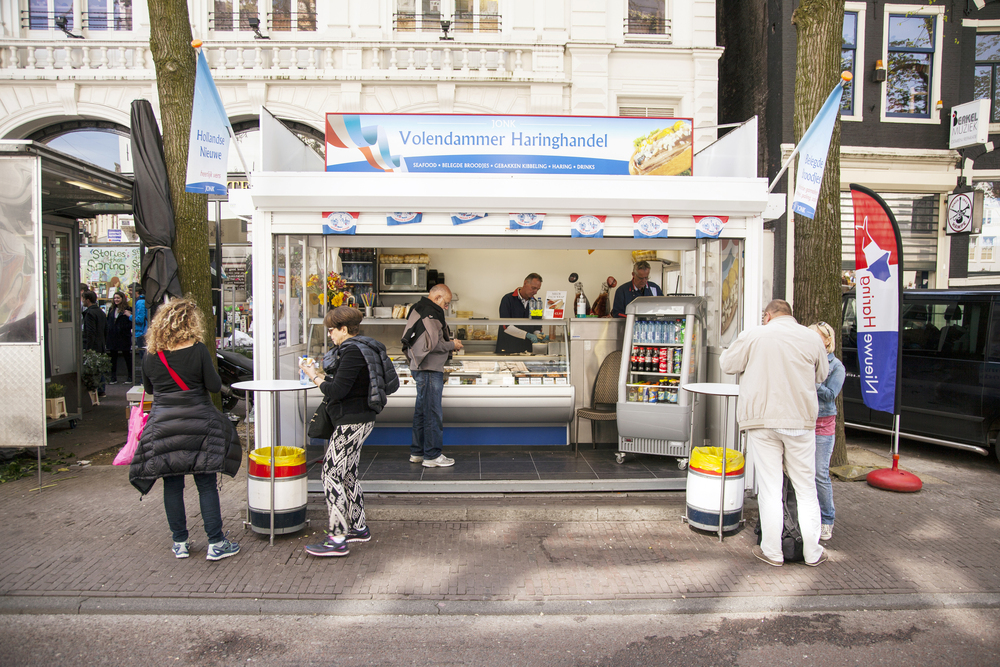Are Amsterdam’s herring stalls about to lose their moorings?

Amsterdammers may soon be looking for their favourite herring stall in vain as the council adopts a disastrous European licence lottery, warns Hans van Tellingen of retail research agency Strabo.
Thanks to a European rule unthinkingly adopted by Amsterdam city council, most of the capital’s herring stalls – and flower stalls – are about to lose their permanent sites.
This is, frankly, a disgrace. With them goes part of the Dutch heritage, sacrificed on the altar of local and European bureaucracy, to say nothing of the people whose “freedom to conduct a business” is being snatched from their hands.
The policy will lead to more shops often of a questionable nature, selling sweets or rubber ducks and the like. Yet these are the very outlets of dubious quality that should be going instead.
What is this all about? In 2017, Brussels informed Amsterdam its licencing system for kiosks was wrong. It is against European rules to issue licences for an unlimited period, nor is it allowed to use a waiting list. That, the EU says, would bar innovation and competition.
Lottery
The current unlimited licences for Amsterdam herring stalls, flower stalls and other fixed-site outlets will be changed to temporary licences over the next two years. Licences will be allocated according to a lottery system, meaning stallholders will not be sure where their business will end up.
The lottery also means that established stall holders will have as much chance of bagging a location as other candidates. They will very likely lose their site, while it remains to be seen if the new stall holders will make a success of the location.
Then there’s the risk of boosting a completely different type of business, such as “money laundries” which are a huge and plentiful problem in the capital’s retail sector.
Last but not least, people who have been on the waiting list for years and are finally nearing the top will find themselves on an equal footing with new contenders. Stall holders whose business goes back generations will be forced to throw in the towel and Amsterdam’s characteristic fish stalls and flower stalls will all but disappear.
Defence
And another thing: how can Brussels know which type of stall will do well, say, on the corner of the Koningsplein and Heiligeweg? It just doesn’t make sense. What’s even worse is that the city’s economic affairs chief Sofyan Mbarki and Amsterdam council seem to agree with the Brussels way of thinking. Why doesn’t Amsterdam stand up and defend its own?
Perhaps it has something to do with the council’s habit of killing off successful retailers. The much-lauded Seafood Shop on Leidsestraat had to close because it practiced “blurring”, meaning it was part shop and part restaurant. Sandwich shop Fratellini, on Haarlemmerstraat, was finally allowed to stay after it gave up blurring and became a shop only, losing a considerable amount in revenue.
A similar thing happened to patisserie Kuyt on Utrechtsestraat, which is hands down the best pastry shop in the country. Amsterdam local council definitely has a thing about harassing entrepreneurs, and good ones in particular.
The council claims their actions are aimed at preventing the city from being overrun by tourists but the effect is that tourist shops are now occupying the sites of the businesses it has chased off. The Seafood Shop is now the umpteenth Candy Pirates outlet.
Say no
Retail and the restaurant business are closely linked. Blurring is not a trend or a hype but a business model which is becoming increasingly mainstream. The Seafood Shop, Kuyt, and Fratelline are just some of the examples.
Embrace this formula, or at least don’t chase off those who practice it. The more time people spend in a shopping area the more they buy. Good food outlets in good shopping areas generate business for everyone. The Haarlemmerstraat, Leidsestraat. Utrechtsestraat and the whole city would benefit.
And what about our fish stalls and flower stalls? Amsterdam must say no to this crazy plan which will have such a devastating effect on Amsterdam’s entrepreneurs. I am a great advocate for European cooperation but sometimes some of the EU’s more unhinged laws and rules harm the local economy.
Should we fear the ire of Brussels and sanctions? No. There may be some grumbling but don’t forget the Netherlands is an economic world power and the biggest net contributor. The EU will think again before sanctioning us for a bit of civil disobedience.
This column appeared earlier in Het Parool
Thank you for donating to DutchNews.nl.
We could not provide the Dutch News service, and keep it free of charge, without the generous support of our readers. Your donations allow us to report on issues you tell us matter, and provide you with a summary of the most important Dutch news each day.
Make a donation